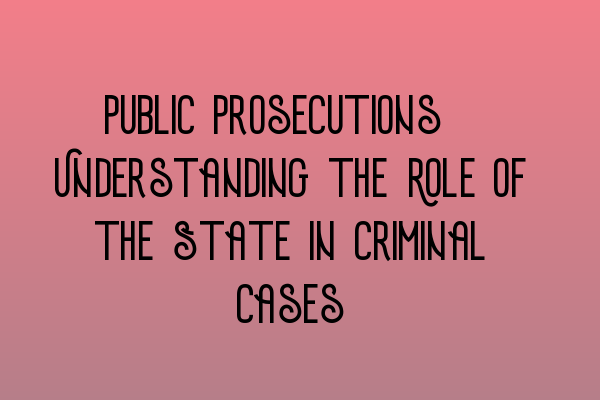Public Prosecutions: Understanding the Role of the State in Criminal Cases
When it comes to criminal cases, the state plays a crucial role in overseeing the prosecution process. Understanding the role of public prosecutions is essential for anyone involved in the criminal justice system, from solicitors to aspiring lawyers preparing for the SQE exam.
The state’s role in criminal cases is to represent the interests of society and seek justice for victims of crime. This involves initiating and conducting legal proceedings against individuals accused of committing criminal offenses. Public prosecutions aim to maintain law and order, protect the public, and ensure that those responsible for criminal acts are held accountable.
Whether you are a solicitor representing a client or a citizen curious about the legal system, it is important to grasp the key aspects of public prosecutions. Let’s explore the main elements of the state’s role in criminal cases.
Role of the Crown Prosecution Service (CPS)
The Crown Prosecution Service (CPS) is the government agency responsible for conducting public prosecutions in England and Wales. The CPS operates independently from the police and other law enforcement agencies, ensuring a fair and impartial prosecution process.
The CPS takes on cases referred by the police and reviews the available evidence to determine whether there is enough to bring charges against an individual. Based on the evidence, the CPS assesses the likelihood of achieving a successful prosecution and considers whether it is in the public interest to proceed with the case.
The CPS works closely with police forces, victims, and witnesses throughout the prosecution process. They provide legal advice, prepare cases for court, and present the evidence in criminal proceedings. The CPS has the power to discontinue a case if new evidence arises or if it is no longer in the public interest to continue the prosecution.
Importance of Fair Trials
One of the fundamental principles of the criminal justice system is the right to a fair trial. The state, through public prosecutions, plays a vital role in upholding this principle. Fair trials ensure that individuals accused of crimes have an opportunity to present their defense, challenge the evidence against them, and receive a fair and impartial judgment.
Public prosecutors have a duty to disclose all relevant evidence to the defense, whether it is favorable or unfavorable to the prosecution’s case. This ensures transparency and allows the defense to adequately prepare their case and address any potential weaknesses in the prosecution’s evidence.
By ensuring fair trials, public prosecutions contribute to maintaining the integrity of the criminal justice system. They protect the rights of defendants and promote confidence in the legal process.
Collaboration with Expert Witnesses
Expert witnesses play a crucial role in criminal cases, providing specialized knowledge and opinions on specific subjects. Public prosecutions often rely on expert testimonies to build strong cases and present evidence to the court.
Expert witnesses can provide scientific, technical, or professional expertise that helps the court understand complex issues. Their input can range from analyzing forensic evidence to interpreting financial records or offering psychological evaluations.
Building a strong case requires effective collaboration between public prosecutors and expert witnesses. The prosecutors must effectively communicate with the experts, gather relevant information, and present it in a manner that the court can understand. This collaboration strengthens the overall case presented by the prosecution.
Conclusion
Understanding the role of public prosecutions in criminal cases is essential for anyone working within the legal system or seeking a career as a solicitor. The state’s responsibility in representing the interests of society, ensuring fair trials, and collaborating with expert witnesses contributes to the successful prosecution of criminal offenders.
To learn more about legal representation for Delaware LLCs in the UK, check out this informative article: Legal Representation for Delaware LLCs in the UK: Expert Advice.
Are you preparing for the SQE exam? Make sure to read this comprehensive guide on essential study materials for aspiring solicitors: SQE Exam Prep: Essential Study Materials for Aspiring Solicitors.
If you’re interested in building strong cases through expert testimonies, this article is a must-read: Expert Testimonies in UK Courts: Building Strong Cases.
To better understand the format of the Solicitors Qualifying Examination, demystify it by reading this informative article: Demystifying the Solicitors Qualifying Examination Format.
If you’re an international lawyer looking to tackle the SQE exam, this article provides valuable insights and success strategies: SQE Exam for International Lawyers: Challenges and Success Strategies.
